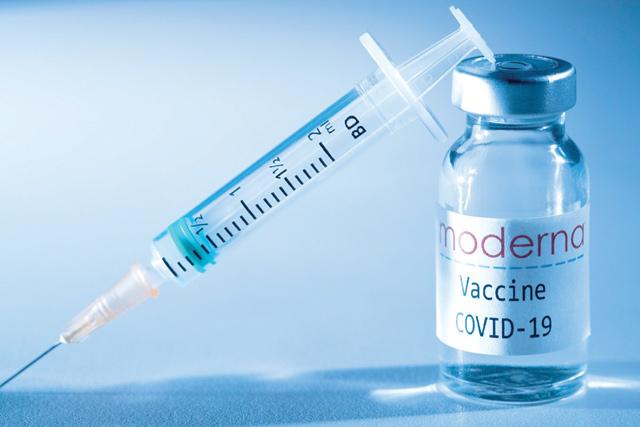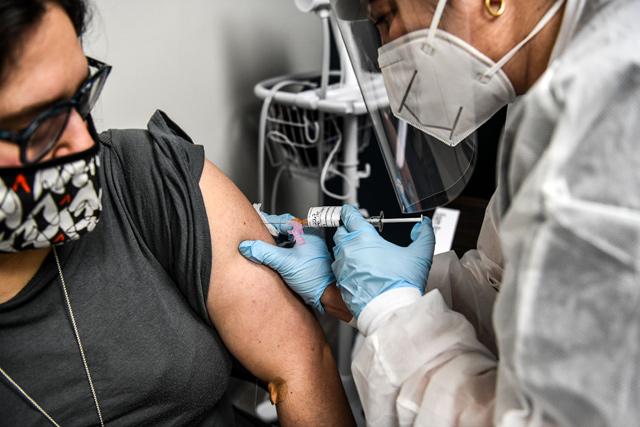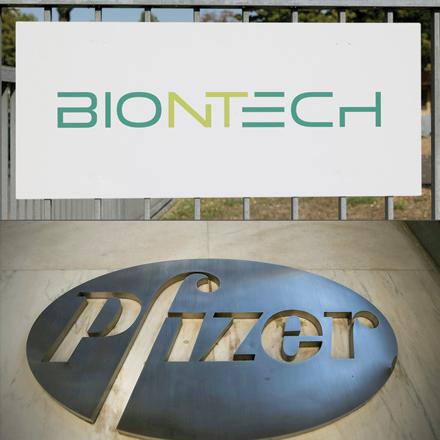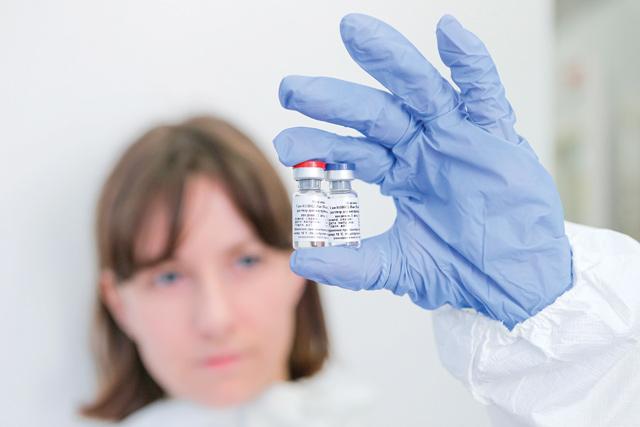You are here
In new breakthrough, Moderna's COVID vaccine nearly 95% effective
By AFP - Nov 17,2020 - Last updated at Nov 17,2020

This creative image taken in a studio in Paris on Monday, showing a syringe and a vaccine vial with the reproducted logo of a US biotech firm Moderna, illustrates the announcement of an experimental vaccine against COVID-19 from Moderna that would be nearly 95 per cent effective (AFP photo)
WASHINGTON — US biotech firm Moderna on Monday announced its experimental vaccine against COVID-19 was almost 95 per cent effective, marking a second major breakthrough in the quest to end the pandemic.
Moderna released early results from a clinical trial with more than 30,000 participants, after American pharmaceutical company Pfizer and its German partner BioNTech last week said their vaccine was 90 per cent effective.
Both front-runners are based on new technology that uses synthetic versions of molecules called "messenger RNA" to hack into human cells and effectively turn them into vaccine-making factories.
"This positive interim analysis from our Phase 3 study has given us the first clinical validation that our vaccine can prevent COVID-19 disease, including severe disease," said Moderna CEO Stephane Bancel.
“Today’s news of a second vaccine is further reason to feel hopeful,” tweeted President-elect Joe Biden, but he cautioned that its widespread distribution was months away.
“Until then, Americans need to continue to practice social-distancing and mask-wearing to get the virus under control,” he said.
Moderna plans to submit applications for emergency approval around the world within weeks, and says it expects to have approximately 20 million doses ready to ship in the US by the end of the year.
The company, which has received $2 billion from the US government under “Operation Warp Speed,” added it is on track to manufacture between 500 million to a billion doses globally in 2021.
Global infections from COVID-19 have soared past 54 million with more than 1.3 million deaths since the virus emerged in China late last year.
President Donald Trump also weighed in on Twitter, to take credit: “Please remember that these great discoveries, which will end the China Plague, all took place on my watch!”
Beginning of the end?
Moncef Slaoui, who leads Operation Warp Speed, told MSNBC he hoped the two would be approved “somewhere towards in the first half of December”, with the Johnson & Johnson vaccine the next on the horizon early next year.
The Moderna vaccine, which was co-developed by the US National Institutes of Health, is given in two doses 28 days apart, and the preliminary results are based on the 95 of the 30,000 volunteers who fell ill with COVID-19.
Of the 95, 90 had been in the trial’s placebo group, and five in the group that received the drug, called mRNA-1273, translating to an efficacy rate of 94.5 per cent.
There were 11 people who fell severely ill, all of whom were in the placebo group.
A small fraction of people experienced severe symptoms such as fatigue, muscle and joint pains, or redness at the injection site, but these side-effects were short lasting.
“The light at the end of the tunnel just got even brighter,” tweeted Atul Gawande, a member of Biden’s coronavirus advisory board and a surgeon at a Harvard-affiliated hospital.
Crucially, Moderna also announced that its vaccine can remain stable at standard refrigerator temperatures of 2ºC to 8ºC for 30 days.
The company added it could be kept in long-term storage at standard freezer temperatures of -20ºC for up to six months.
Pfizer’s vaccine, on the other hand, needs to be stored in deep-freezer conditions of -70ºC which could complicate supply chain logistics, particularly in less developed countries.
On the downside, Moderna’s vaccine has about three times more genetic material per dose than its Pfizer counterpart, Zoltan Kis, a research associate at Imperial College’s Future Vaccine Manufacturing Hub, said.
This would raise production costs and make it harder to scale-up.
Questions remain
The promising results of both vaccines are seen as a validation for mRNA technology, which has never before been brought to regulatory approval but has the potential to transform the field.
It is not yet clear how long lasting the protection will be from either the Moderna or Pfizer vaccines, nor how well they work for the elderly, the age-group at highest risk from COVID-19.
Another open question is whether they stop people who are exposed to the virus from transmitting it on to the other people, even though they may be themselves protected from the disease.
Related Articles
WASHINGTON — Pfizer and BioNTech said Wednesday a completed analysis of their experimental COVID-19 vaccine found it protected 95 per cent o
FRANKFURT AM MAIN — Europe's medicines regulator said Tuesday it would decide by December 29 whether to grant emergency approval to a COVID-
PARIS — Russia's Sputnik V vaccine is 91.6 per cent effective against symptomatic COVID-19, according to results published in The Lancet on














